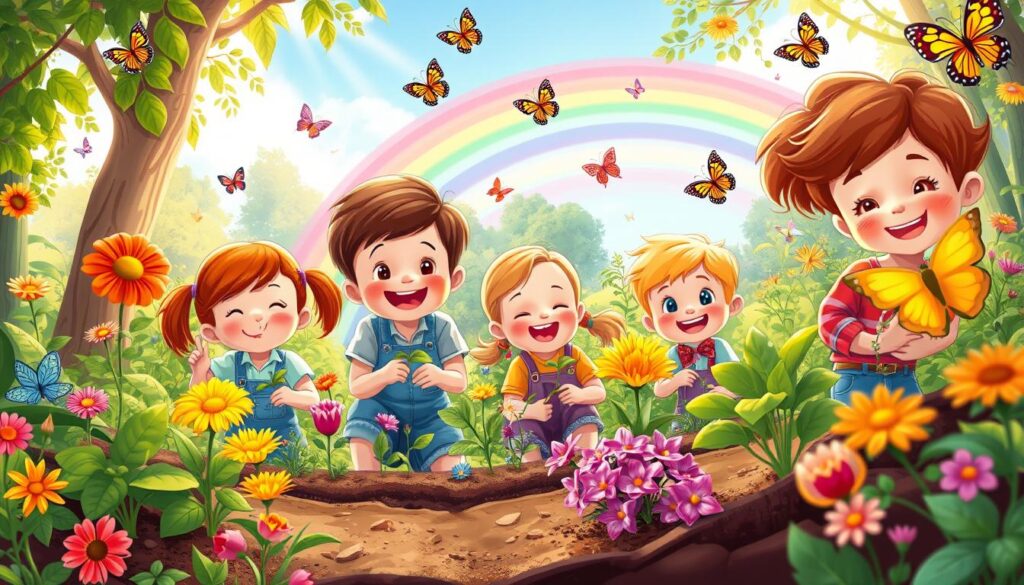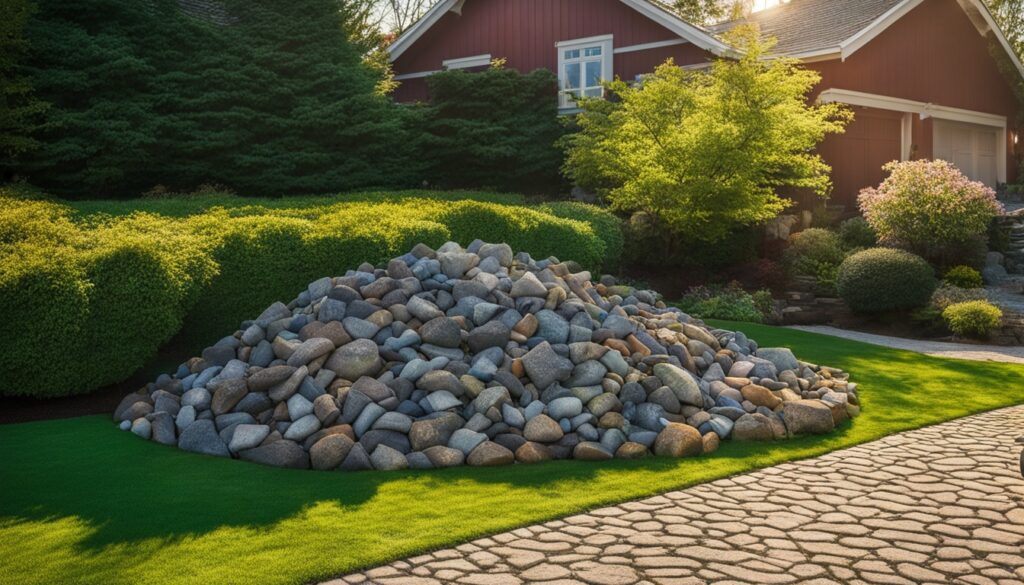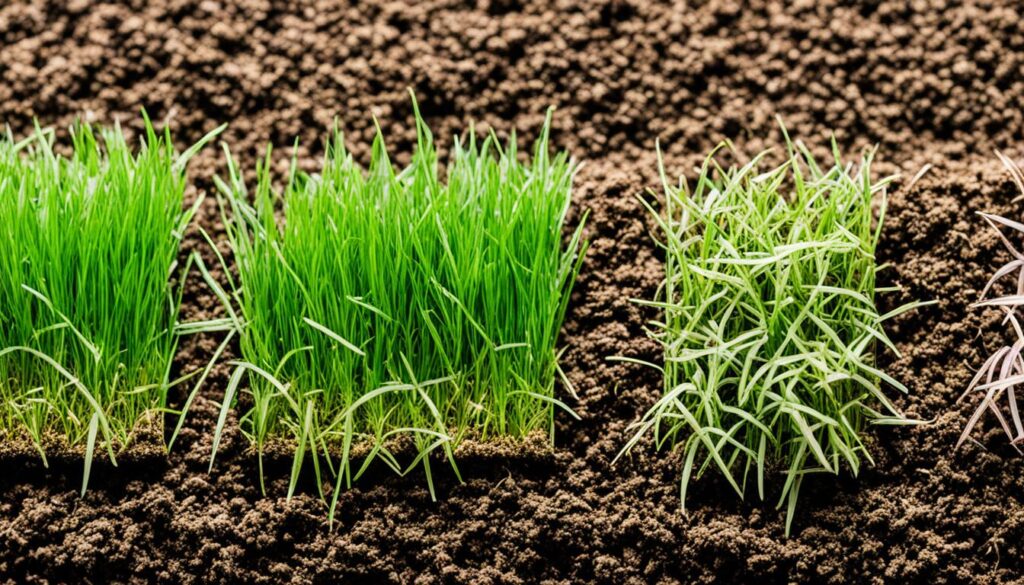Did you know that gardening can really help a child feel better about life? This is key in our fast world where kids face many emotional issues. Gardening is a great way to help kids grow socially and emotionally. It connects them with nature, helping them heal and bounce back stronger.
As I explore gardening’s benefits, you’ll see how it helps with anxiety and stress. It also boosts a child’s emotional smarts.
Key Takeaways
- Gardening can positively impact a child’s emotional development and mental health.
- Connecting with nature through gardening reduces anxiety and enhances self-esteem.
- Hands-on gardening activities cultivate empathy and responsibility in children.
- Gardening promotes mindfulness, encouraging emotional regulation.
- Access to green spaces improves attention and reduces conflict among kids.
- Parents and communities benefit from gardening activities fostering personal connections.
The Therapeutic Benefits of Gardening
Gardening is a great way for kids to heal emotionally, especially when they face tough times. Being in nature, like gardens, helps their mental health by lowering stress and anxiety. It makes them feel calm and relaxed, which is key for feeling good emotionally.
Connecting with Nature for Emotional Healing
By planting and watering, kids can bond with the earth, helping them heal from past hurts. These activities do more than just relax them; they help them grow emotionally. As they work in their garden, they learn to share their feelings, which helps them understand themselves better.
Reducing Anxiety and Stress Through Outdoor Activities
Gardens are known for lowering anxiety. Gardening keeps kids busy both in body and mind, helping them stay focused and mindful. Being around nature has a calming effect, which can lessen stress. Regular outdoor activities help kids handle their feelings better and become more resilient.
| Benefits of Gardening | Therapeutic Effect |
|---|---|
| Reducing Stress | Engaged outdoor activities lead to lower stress levels and increased relaxation. |
| Emotional Healing | Connection with nature fosters emotional recovery and resilience. |
| Social Skills Development | Gardening activities can enhance empathy and understanding among peers. |
| Mindfulness | Gardening promotes concentration and awareness of emotions. |
| Increased Self-esteem | Children develop a sense of pride and achievement by nurturing plants. |
How Does Gardening Help a Child’s Emotional Development
Gardening is great for a child’s emotional growth. It teaches them about empathy and managing feelings. By taking care of plants, kids learn to be kind and handle their emotions better.
Cultivating Empathy and Compassion
Gardening helps kids feel for others by showing them the needs of plants. When they help with plants, they see how to meet those needs. This builds their understanding of emotions and helps them make better friends.
Fostering Emotional Regulation and Calmness
Gardening is calming for kids. It lets them deal with stress through simple tasks like planting and watering. Seeing their plants grow makes them feel proud and happy. This bond with nature teaches them to control their feelings, making them stronger emotionally.
| Benefit | Details |
|---|---|
| Empathy | Children learn to recognize and respond to the needs of living plants, enhancing their emotional intelligence. |
| Emotional Regulation | The calming nature of gardening helps children manage stress and reflect on their feelings. |
| Sense of Accomplishment | Watching plants grow boosts self-esteem and fosters a sense of achievement. |
| Compassion | Nurturing plants cultivates compassion towards other living beings, contributing to better social interactions. |
Building Responsibility Through Gardening
Gardening is a great way for kids to learn important life skills. Taking care of plants teaches them about responsibility. They see how their actions help or hurt the garden. This makes them understand their role in keeping the garden healthy.
As they plant and care for plants, they feel proud of their work. They see how their efforts help the garden grow. This builds a sense of accountability in them.
Teaching Accountability by Caring for Plants
Kids do better when they know their part in a project. In gardening, they learn to be accountable. They water, weed, and watch their plants grow.
This teaches them that not doing their part can harm the garden. They see how their actions affect the plants. This helps them take their responsibilities seriously.
Understanding Consequences of Actions
In the garden, kids learn about the effects of their actions. Overwatering can kill a plant, and not watering enough can make it wilt. They see how their choices matter.
This teaches them to think carefully before acting. Gardening helps them connect their actions with the results. It’s a key part of growing up and making good choices.
Doing these things often makes kids appreciate nature more. Guides like this one show how gardening helps kids grow emotionally. It’s a way for them to learn about themselves and the world around them.
Developing Emotional Intelligence with Gardening
Gardening is a great way for kids to grow their emotional smarts. It lets them feel and share their feelings with nature. By taking care of plants, they learn about growth, responsibility, and understanding others’ and their own feelings.
Recognizing Emotions in Themselves and Others
In the garden, kids get to know themselves better. This helps them spot their feelings and see how others feel too. Working with plants helps them grow personally, making them more aware of how emotions shape their actions. Studies show that gardening can really boost emotional health.
Promoting Self-awareness and Growth
Gardening does more than just teach about feelings. It helps kids grow in self-awareness and personal growth. By looking after plants, they learn patience and the value of caring for others. This helps them be more empathetic and improves their social skills. Many teachers and parents see how gardening makes kids more connected and skilled in social situations.
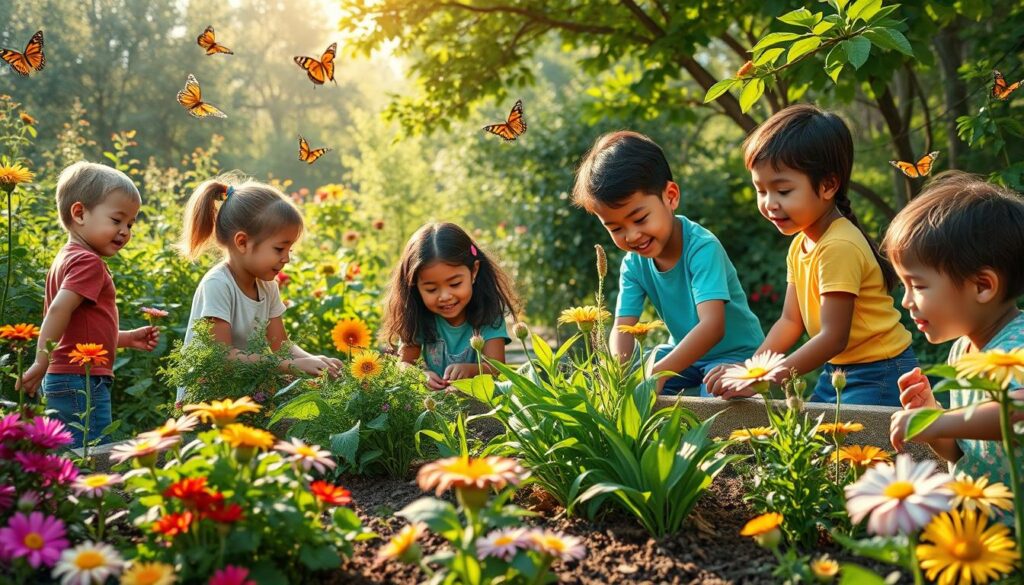
| Emotional Intelligence Development Areas | Positive Impacts of Gardening |
|---|---|
| Self-awareness | Improved understanding of emotions |
| Empathy | Increased ability to relate to others |
| Self-regulation | Enhanced control over emotional responses |
| Social Skills | Better teamwork and collaboration |
| Problem-solving | Encouraged critical thinking and adaptability |
Research shows that gardening is good for kids’ emotional health. It helps them deal with stress and connect deeper with others. The studies highlight how gardening is a simple way to manage feelings.
Mindfulness and Awareness: The Garden as a Classroom
The garden is perfect for teaching kids about mindfulness and awareness. By working with plants and soil, I teach them to live in the moment. This helps them enjoy their senses and feel better emotionally through hands-on activities.
Gardening lets kids see how their world changes. This helps them bond with nature and learn about mindfulness. It helps them focus, feel less anxious, and stay emotionally stable. Studies show that mindfulness helps young people’s mental health a lot.
Gardening is not just about physical work. It also helps kids learn important social and emotional skills. Working together in the garden, they learn to care for each other and their environment. This shows how being aware of our surroundings affects our feelings and relationships.
Being in green spaces like gardens can change kids for the better. It helps them focus better and bounce back from tough times. By taking care of plants, kids learn responsibility and find time for self-reflection and awareness.
Gardening is more than just planting seeds. It shows how taking care of a garden can help us grow inside. Being in nature through gardening gives kids a special experience that can change their emotional health for the better. For more on this, check out the benefits of mindfulness in gardening.
Social Skills Development Through Cooperative Gardening Activities
Children learn a lot from working together in the garden. They practice teamwork and cooperation. They also get better at talking to each other and making friends. These skills help them grow emotionally and socially.
Teamwork and Cooperation in Garden Projects
Children need to work together in the garden. They share tasks, take turns, and use tools together. This teaches them the importance of teamwork and how to work well with others.
Here’s a table that shows how teamwork and cooperation work in gardening:
| Aspect | Description | Benefit |
|---|---|---|
| Collaboration | Working together on tasks such as planting, watering, and weeding. | Fosters a sense of belonging and mutual support. |
| Shared Resources | Using tools and supplies cooperatively. | Encourages responsibility and respect for shared items. |
| Problem-solving | Tackling challenges that arise during gardening, such as pest control or plant health. | Enhances critical thinking skills and adaptability. |
Effective Communication among Peers
Good communication is key in the garden. Kids share ideas, listen, and give feedback. This helps them get better at talking and working together. It also helps them make friends and strengthen their bonds with others.
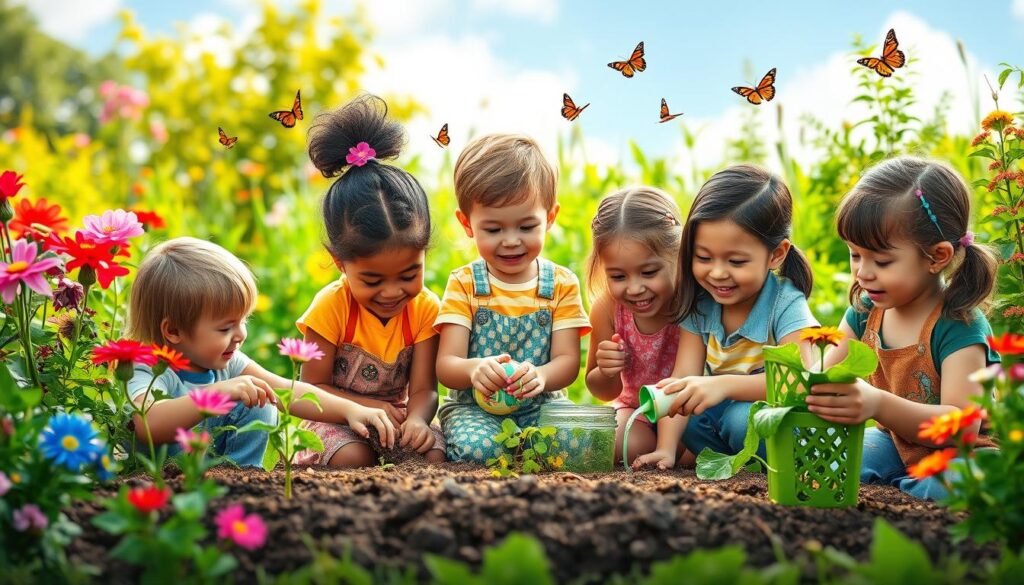
Cooperative gardening helps kids develop important social skills. They learn to work together and make strong emotional connections. The garden is a place where they can learn and grow with friends.
Patience and Delayed Gratification in Gardening
Gardening is a great way for kids to learn important life skills like patience and delayed gratification. It lets them see how plants grow, showing the value of waiting and caring for them.
Understanding the Growth Process
Watching seeds grow into plants takes time, sometimes days or weeks. This teaches kids the value of patience in a world where things happen fast. Each seed starts a growth journey that needs regular care and attention.
As kids take care of their plants, they learn to appreciate the time it takes for results. This helps them deal with slow progress in other parts of life too.
Building Resilience Through Waiting
Gardening makes kids wait for many things. Not all plants grow right away, and some may struggle or not make it. These experiences help kids become more resilient.
They learn to handle setbacks well. Knowing that challenges are part of learning, they build strong emotional strength. This helps them keep going towards their goals, even when faced with obstacles in life.
Enhancing Problem-solving Skills in Children
Gardening is a great way for kids to learn important problem-solving skills. They face many challenges that make them think creatively and adapt. This helps them grow mentally.
Overcoming Challenges in Garden Care
Children might see problems like plant diseases or pests in their garden. These issues make them think and find solutions. They might look up organic fixes, ask for advice, or try new gardening methods.
This hands-on learning makes them better at solving problems. It also builds their confidence in overcoming challenges.
Creative Solutions for Plant Care Issues
Every time kids garden, they get to come up with new ideas. They might figure out how to make soil better or find smart ways to water plants. These experiences teach them to think differently.
By understanding what their plants need, kids learn to be flexible. This not only boosts their problem-solving skills but also helps their creativity and critical thinking.
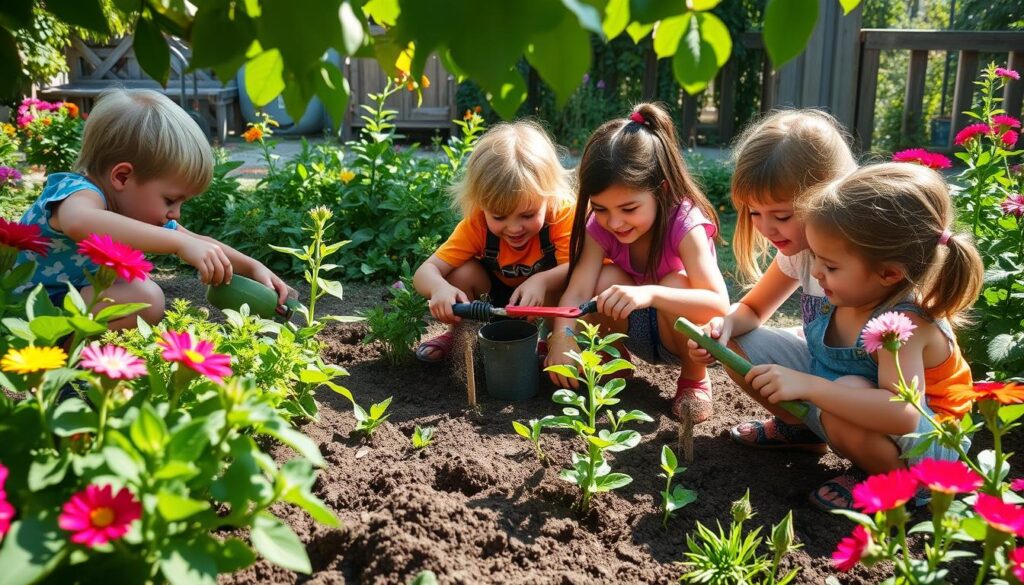
Outdoor Activities Promoting Physical and Emotional Well-Being
Today, kids often play indoors, leading to more sitting and obesity. Outdoor activities, especially gardening, are great against too much screen time. They let kids move and connect with nature, boosting health and happiness.
Combating Screen Time with Active Gardening
Gardening is a great way to fight screen time in kids. It makes kids move and feel the outdoors in a way screens can’t. This helps with skills like balance and strength, and teaches them to care for nature.
Boosting Physical Health for Mental Well-Being
Being outside can lower stress and anxiety in kids. It’s good for their feelings and helps them sleep better. Kids who play outside make friends and handle their feelings better, which is good for their social skills.
Experts say kids need three hours of outdoor play daily. This helps with sleep and builds strong friendships. Programs like Prescribe Outside show how being outside is key for a healthy life, helping both mind and body.
| Benefits of Outdoor Activities | Impact on Physical Health | Impact on Emotional Well-Being |
|---|---|---|
| Improved Motor Skills | Enhances coordination, balance, and strength | Supports confidence and self-esteem |
| Reduced Risk of Obesity | Encourages regular physical activity | Promotes mental clarity and mood improvement |
| Sensory Stimulation | Aids cognitive development through exploration | Reduces anxiety and boosts creativity |
| Social Skill Development | Encourages sharing and cooperation | Enhances communication and conflict resolution |
| Exposure to Natural Sunlight | Regulates sleep patterns and vitamin D production | Improves overall mood and focus |
Gardening and other outdoor activities are great for kids’ health and happiness. For more on outdoor play benefits, check out this useful resource.
Conclusion
Gardening has a big impact on how children feel and grow emotionally. It teaches them important skills like nurturing. Kids learn by watering and pruning plants, improving their fine motor skills and feeling responsible.
They also learn to eat healthier by growing their own food. This makes them proud of what they’ve done. Studies show that just 30 minutes in the garden a day can lower stress levels in kids.
This time in nature boosts their confidence as they see their hard work pay off. It also brings families closer through gardening together, making memories that last. Gardening is more than just a hobby. It helps kids become emotionally strong, patient, and focused, setting them up for a healthier life.
FAQ
How does gardening help with a child’s emotional development?
Gardening lets kids connect with nature in a hands-on way. This helps them learn about feelings, responsibility, and empathy. It’s key for their emotional growth.
What are the therapeutic benefits of gardening for children?
Gardening helps kids feel less anxious and stressed. It makes them calm by letting them care for plants. This is good for their mental health.
How can gardening foster emotional regulation in kids?
By taking care of plants, kids learn about their feelings and how to handle stress. This activity creates a calm space for them to manage their emotions.
In what ways does gardening teach responsibility to children?
Looking after plants teaches kids the importance of their growth. They see how their actions affect their garden. This teaches them about being responsible and understanding cause and effect.
How does gardening promote emotional intelligence in children?
Gardening helps kids notice and talk about their feelings. It makes them more aware of their own and others’ emotions. This builds empathy and self-awareness.
What role does mindfulness play in gardening for kids?
The garden is a place to learn mindfulness. It teaches kids to be in the moment and aware. Gardening also makes them appreciate nature and feel emotionally stable.
How do cooperative gardening activities enhance social skills?
Working together in the garden improves teamwork and cooperation in kids. They learn to communicate well, listen, share, and work with others.
Why is patience important in gardening?
Gardening shows kids the importance of waiting for plants to grow. This teaches them patience and resilience. It helps them handle expectations in other parts of life.
How does gardening improve problem-solving skills?
Gardening has challenges like pests and diseases that need creative solutions. These challenges make kids think critically and solve problems in new ways.
Can gardening help combat excessive screen time?
Yes, gardening gets kids outside and away from screens. It’s a healthy way to reduce too much screen time. This is good for their physical and mental health.

